Police disperse Bedouin protesters in southern Israel
Thu., January 13, 2022



APTOPIX Bedouin protesters clash with Israeli forces following a protest against an afforestation project by the Jewish National Fund in the southern Israeli village of Sa'we al-Atrash in the Negev Desert, southern Israel, Thursday, Jan. 13, 2022.
Thu., January 13, 2022



APTOPIX Bedouin protesters clash with Israeli forces following a protest against an afforestation project by the Jewish National Fund in the southern Israeli village of Sa'we al-Atrash in the Negev Desert, southern Israel, Thursday, Jan. 13, 2022.
(AP Photo/Tsafrir Abayov)
JERUSALEM (AP) — Israeli police on Thursday fired tear gas, rubber bullets and stun grenades to disperse hundreds of Bedouin Arabs protesting a tree-planting campaign they say is aimed at pushing them off disputed land.
It was the third consecutive day of demonstrations by Bedouin residents of southern Israel's Negev desert against a forestry project they say is aimed at seizing land near unrecognized villages.
Video footage from the scene shows hundreds of people blocking the desert highway. Police then intervene with tear gas, rubber bullets and stun grenades to clear the road. They said 13 people were arrested in what they described as a violent disturbance. Police released video clips showing people throwing rocks at cars. They said three people were hospitalized with minor injuries.
Thursday's demonstration came a day after the government announced a compromise to suspend the tree-planting campaign, which is being conducted by a quasi-governmental organization. The forestry project caused a crisis within the fragile ruling coalition, which includes a small Islamist party with significant support among Bedouins in southern Israel.
The Bedouin view the forestry project as part of a larger attempt by authorities to confiscate grazing lands and force them into planned communities, a perceived assault on their traditional lifestyle. Israel says they need to move into planned towns so it can provide public services.
The latest flare-up in the dispute, which goes back decades, risks dividing Israel’s government, the first to include an Arab party.
The Bedouin are one of Israel's poorest communities and are part of Israel’s Arab minority, which makes up some 20% of the country’s population. They have citizenship, including the right to vote, but face discrimination. Arab citizens of Israel have close family ties to the Palestinians and often identify with their cause.
JERUSALEM (AP) — Israeli police on Thursday fired tear gas, rubber bullets and stun grenades to disperse hundreds of Bedouin Arabs protesting a tree-planting campaign they say is aimed at pushing them off disputed land.
It was the third consecutive day of demonstrations by Bedouin residents of southern Israel's Negev desert against a forestry project they say is aimed at seizing land near unrecognized villages.
Video footage from the scene shows hundreds of people blocking the desert highway. Police then intervene with tear gas, rubber bullets and stun grenades to clear the road. They said 13 people were arrested in what they described as a violent disturbance. Police released video clips showing people throwing rocks at cars. They said three people were hospitalized with minor injuries.
Thursday's demonstration came a day after the government announced a compromise to suspend the tree-planting campaign, which is being conducted by a quasi-governmental organization. The forestry project caused a crisis within the fragile ruling coalition, which includes a small Islamist party with significant support among Bedouins in southern Israel.
The Bedouin view the forestry project as part of a larger attempt by authorities to confiscate grazing lands and force them into planned communities, a perceived assault on their traditional lifestyle. Israel says they need to move into planned towns so it can provide public services.
The latest flare-up in the dispute, which goes back decades, risks dividing Israel’s government, the first to include an Arab party.
The Bedouin are one of Israel's poorest communities and are part of Israel’s Arab minority, which makes up some 20% of the country’s population. They have citizenship, including the right to vote, but face discrimination. Arab citizens of Israel have close family ties to the Palestinians and often identify with their cause.
Israeli police and Bedouin clash in tree-planting protests

Israeli security forces clash with Bedouins during protest against forestation at the Negev desert village of Sawe Al-Atrash on Thursday. (Reuters) BEDOUIN RIDERS
Bedouin, who are part of Israel's 20 percent Arab minority, have long opposed tree-planting initiatives in the Negev

NEGEV, Israel: Israeli police and Bedouin protesters clashed Thursday in the latest unrest over a tree-planting project in the Negev desert, a day after authorities appealed for compromise, AFP journalists said.
Protesters have held a series of demonstrations in recent days over the environmental scheme in southern Israel’s arid desert region, posing a thorny challenge for the fragile coalition government.
“Police dispersed the demonstrators who blocked a road in the Negev and threw stones at the police,” the security forces said in a statement.
Thirteen people were arrested in the events, the statement added.
An AFP photographer was lightly injured during the clashes.
The latest unrest in the decades-long dispute has attracted fresh attention given the make-up of Israel’s coalition government, led by right-wing Prime Minister Naftali Bennett.
Bennett’s government counts on the backing from the leader of the Islamist Raam party, Mansour Abbas, whose core political support comes from Bedouin in the Negev.
Abbas told Israel’s Channel 12 news on Tuesday that his party will not vote with the coalition unless the tree planting is halted and formal negotiations with Bedouin leaders are launched to seek a compromise.
On Wednesday, Social Affairs Minister Meir Cohen said that a “compromise” had been reached that would allow for “accelerated negotiations” to take place.
But clashes have continued.
Hundreds of Bedouins clash with police over controversial Negev tree planting
Israeli security forces clash with Bedouins during protest against forestation at the Negev desert village of Sawe Al-Atrash on Thursday. (Reuters) BEDOUIN RIDERS
AFP
January 13, 2022
Protesters have held demonstrations in recent days over the environmental scheme in southern Israel's arid desert region
January 13, 2022
Protesters have held demonstrations in recent days over the environmental scheme in southern Israel's arid desert region
Bedouin, who are part of Israel's 20 percent Arab minority, have long opposed tree-planting initiatives in the Negev

NEGEV, Israel: Israeli police and Bedouin protesters clashed Thursday in the latest unrest over a tree-planting project in the Negev desert, a day after authorities appealed for compromise, AFP journalists said.
Protesters have held a series of demonstrations in recent days over the environmental scheme in southern Israel’s arid desert region, posing a thorny challenge for the fragile coalition government.
Bedouin, who are part of Israel’s 20 percent Arab minority, have long opposed tree-planting initiatives in the Negev, blasting them as a de facto government land grab in areas they call home.
“Police dispersed the demonstrators who blocked a road in the Negev and threw stones at the police,” the security forces said in a statement.
Thirteen people were arrested in the events, the statement added.
An AFP photographer was lightly injured during the clashes.
The latest unrest in the decades-long dispute has attracted fresh attention given the make-up of Israel’s coalition government, led by right-wing Prime Minister Naftali Bennett.
Bennett’s government counts on the backing from the leader of the Islamist Raam party, Mansour Abbas, whose core political support comes from Bedouin in the Negev.
Abbas told Israel’s Channel 12 news on Tuesday that his party will not vote with the coalition unless the tree planting is halted and formal negotiations with Bedouin leaders are launched to seek a compromise.
On Wednesday, Social Affairs Minister Meir Cohen said that a “compromise” had been reached that would allow for “accelerated negotiations” to take place.
But clashes have continued.
Demonstrators block highway; officers respond with tear gas, stun grenades; 3 hospitalized, 13 arrested during 3rd day of protests
By EMANUEL FABIAN and TOI STAFF
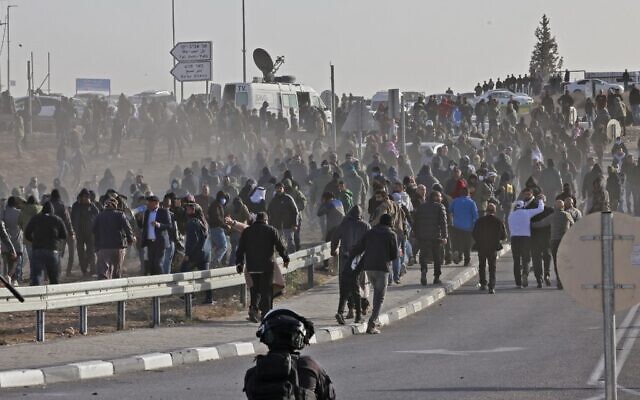
Bedouin protesters and Israeli forces clash during a protest in the southern Israeli village of Sawe al-Atrash in the Negev Desert against a forestation project by the Jewish National Fund (JNF), on January 13, 2022. (Menahem KAHANA / AFP)
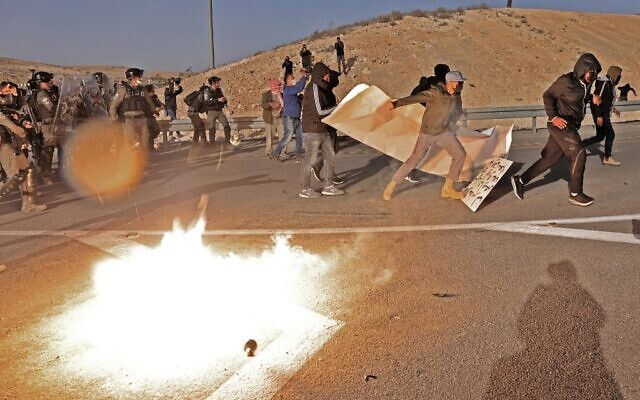
Bedouin protesters and Israeli forces clash during a protest in the southern Israeli village of Sawe al-Atrash in the Negev Desert against a forestation project by the Jewish National Fund (JNF), on January 13, 2022. (Menahem KAHANA / AFP)
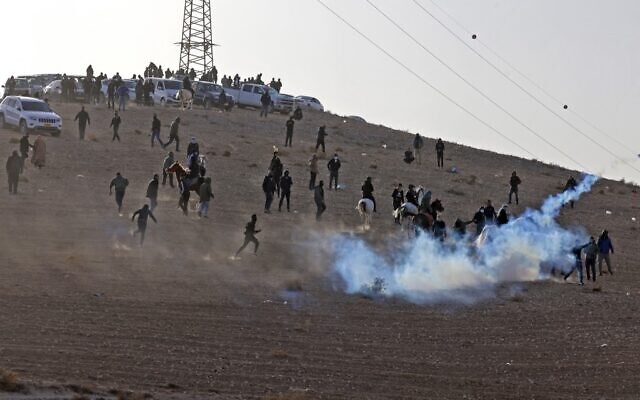
Bedouin protesters and Israeli forces clash during a protest in the southern Israeli village of Sawe al-Atrash in the Negev Desert against a forestation project by the Jewish National Fund (JNF), on January 13, 2022. (Menahem KAHANA / AFP)
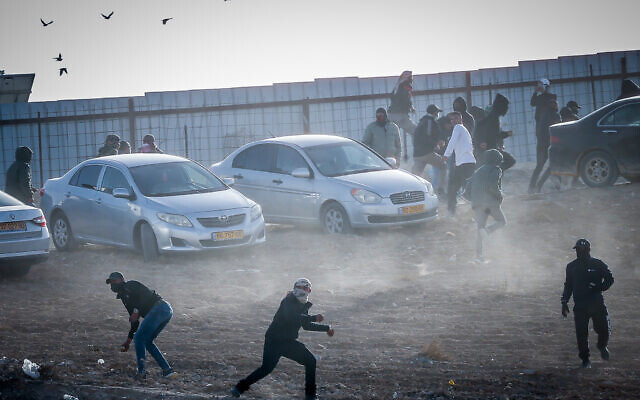
Bedouin protesters and Israeli forces clash during a protest in the southern Israeli village of Sawe al-Atrash in the Negev Desert against an forestation project by the Jewish National Fund (JNF), on January 13, 2022. (Jamal Awad/Flash90)
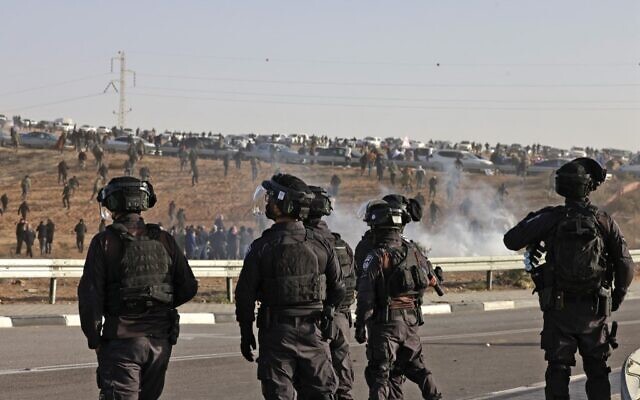
Bedouin protesters and Israeli forces clash during a protest in the southern Israeli village of Sawe al-Atrash in the Negev Desert against a forestation project by the Jewish National Fund (JNF), on January 13, 2022. (Menahem KAHANA / AFP)
Hundreds of Bedouin protesters clashed with police on Thursday afternoon for the third day in a row over a controversial forestation project in the Negev Desert, despite reports indicating the government was seeking a compromise.
The demonstrators blocked the Route 31 highway near the southern village of Sawe al-Atrash, and some hurled stones at officers, according to police.
Video posted online showed officers using stun grenades and tear gas to disperse the demonstration.
At least 12 demonstrators were reportedly hurt during the clash, of whom three were hospitalized at Beersheba’s Soroka Medical Center.
Police said 13 people were arrested at Thursday’s protest.
Police said that due to the demonstration, the highway remained closed from Shoket Junction to Tel Arad Junction. “We will allow freedom of protest as long as it is done according to the law, and we will act with zero tolerance against disturbance,” the police statement read.
The demonstrations came following a Jewish National Fund planting in the region, seen by the Bedouin communities as part of a government effort to expel them from their unrecognized hamlets.
Police said Thursday morning that 21 rioters were arrested during the night in Tel Sheva, Segev Shalom and Rahat. On the previous night, 18 people were arrested.
Citing unnamed sources with knowledge of the matter, the Kan public broadcaster reported Wednesday that an “unprecedented” plan was to be advanced by the government that would include recognition of 10 to 12 Bedouin villages that are currently illegal.
The report said that planned planting in the most contentious areas — where the Bedouin al-Atrash clan lives — won’t resume next week to give the negotiations a chance to progress, though it will resume elsewhere.

Bedouin protesters and Israeli forces clash during a protest in the southern Israeli village of Sawe al-Atrash in the Negev Desert against a forestation project by the Jewish National Fund (JNF), on January 13, 2022. (Jamal Awad/Flash90)
The planting and the ensuing violent clashes with police threatened to topple Israel’s nascent, motley coalition, with the Islamist Ra’am party vowing to boycott plenum votes as long as Keren Kayemet L’Yisrael-Jewish National Fund’s (KKL-JNF) work continued in the Negev, where they enjoy the largest bloc of support.
In response to the announcement from Ra’am chairman Mansour Abbas, Yamina MK Nir Orbach announced Wednesday that he too would not attend plenum votes so long as Ra’am refused to do so. And Meretz MK Yair Golan threatened to do the same too, after Housing Minister Ze’ev Elkin of the New Hope party vowed that the tree-planting would continue.
Explainer: Why tree planting in the Negev sparked protests, riots and a coalition crisis
With a narrow 61-seat majority in the Knesset, the absences threatened to prevent the coalition from passing any legislation so long as the crisis continues.
Indeed, with the coalition lacking numbers, opposition lawmakers began submitting legislation for preliminary approval before the plenum on Wednesday evening. To avoid the embarrassment, coalition MKs left the plenum and several pieces of legislation advanced overwhelmingly, including a bill from Joint List MK Ahmad Tibi that would require police officers to wear body cameras when securing protests. The opposition’s bills are still unlikely to pass subsequent readings, but the events concluded a humiliating day for the coalition.

Bedouin protesters and Israeli forces clash during a protest in the southern Israeli village of Sawe al-Atrash in the Negev Desert against a forestation project by the Jewish National Fund (JNF), on January 13, 2022. (Menahem KAHANA / AFP)
KKL-JNF chairman Avraham Duvdevani told Kan on Wednesday that his organization was just a government contractor and wasn’t setting policy.
“We have been planting trees in the Negev for 15 years in the same format as right now,” Duvdevani said. “There was nothing different from what we have been doing all these years. We have no idea what’s different now. The instructions to halt plantings have been sporadic, and we resumed full work after a few days.
“We will continue planting in the entire Negev. This is part of the Zionist vision.”
Negev Bedouin have a contentious relationship with the state. For decades, the government has sought to move them into recognized, planned cities, but many still live in a constellation of illegal hamlets that sprawl across Israel’s southern desert.
Bedouins accuse KKL-JNF of seeking to displace them, but the organization says it is merely fulfilling a request by other government bodies on public land. KKL-JNF works across Israel on nature and conservation projects, but some charge the organization has a political agenda.



No comments:
Post a Comment